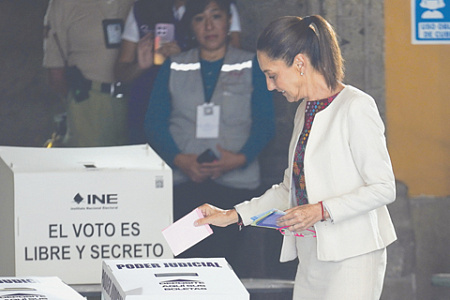
In Mexico, the counting of votes for the first judicial elections in the country’s history is coming to an end. The judicial reform initiated by former President Andres Manuel Lopez Obrador continues to provoke discussions about its necessity. It was assumed that the residents of the country would choose the most worthy candidates. However, the Mexicans themselves were not interested in voting: the turnout was about 13%. Nevertheless, the head of the country, Claudia Sheinbaum, said that the elections were a “complete success.”
“Mexico is the most democratic country in the world,” the president said shortly after voting on Sunday in the presence of her husband Jesus Maria Tarriba. The vote count is coming to an end, but the final results will be announced on June 15. The turnout is estimated to be between 12.5 and 13.2%, according to French media.
“For the first time in history, almost 13 million Mexican women and men have exercised their right to choose new ministers, magistrates and judges,” the president said in a video message posted on social media.
Not everyone agrees with this interpretation. On Sunday, thousands of residents of Mexico City came out to protest against the reform. They had a lot of arguments. Firstly, qualification requirements for elected judges have been reduced. Although they still exist: legal education and practice corresponding to education. Secondly, the reform was seen as a desire by the executive branch to subjugate the judicial branch. Thirdly, there were concerns that the elections and the elected judges could be influenced by crime, in particular drug cartels (see “NG” dated 09/01/24).
Those who defended the iconic figures of the criminal world also participated in the elections. For example, Silvia Delgado is the former lawyer of the famous drug lord Joaquin Guzman, known by the nickname El Chapo.
Recall that the reform caused the rejection of the United States and Canada, partners in the USMCA (United States–Mexico-Canada Agreement) trade agreement, which at one time even led to Obrador defiantly severing diplomatic ties with Washington and Ottawa.
The judicial system in the Latin American country is an opaque and confusing corporate system, vulnerable to corruption and full of bureaucratic nuances. Because of this, the reputation of the judiciary among the population is extremely low. This is what Obrador’s reform was designed to fix.
However, it was significant that the initiator of the reform started it not at the beginning, but towards the end of his six-year presidential term. Obrador still did not want to quarrel with the judicial branch. But Sheinbaum, who had the most active phase of the reforms, enthusiastically supported it herself. In general, it is impossible to say that Obrador “slipped” a problematic issue to his successor.
Since the current judges allegedly serve certain elites, as the former president stated, the Mexican people themselves had to choose worthy judges. However, the low turnout predictably raises questions about the legitimacy of the new judges. But this issue is also relevant for current judges.
“The current judiciary was so far removed from the Mexicans that even such a low turnout does not mean that the reform has failed. Moreover, it is unlikely that many voters in other countries would have come to the election of judges. After all, the same thing is happening all over the globe with municipal elections – people simply do not understand why they should attend them,” explains Viktor Kheifets, director of the Center for Ibero–American Studies at St. Petersburg State University.
In a conversation with NG, he noted that Sheinbaum wanted to achieve a turnout of at least 20%. Obviously, she did not achieve this goal. In addition, a number of representatives of the left intelligentsia, who had high hopes for her, had already become disillusioned with her policies.
